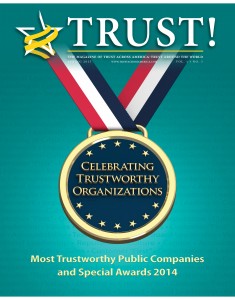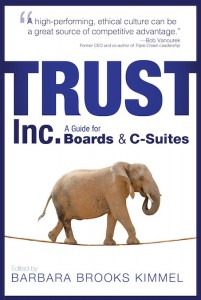Trust Across America Names Most Trustworthy Public Companies
and North American Trust Award Honorees 2014
Trust Across America- Trust Around the World (TAA-TAW) global leaders in organizational trust, today announced the results of a five-year study of over 2000 US based public companies, naming Texas Instruments (TI) as the Most Trustworthy Public Company for the period 2010-2014. Barbara Kimmel, Executive Director states: “We are pleased to see TI top this list. The company has a history of trustworthy behavior as evidenced by the following long-term corporate vision:
“One of TI’s greatest strengths is its values and ethics. We had some early leaders who set those values as the standard for how they lived their lives. And it is important that TI grew that way. It’s something that we don’t want to lose. At the same time, we must move more rapidly. But we don’t want to confuse that with the fact that we’re ethical and we’re moral. We’re very responsible, and we live up to what we say.”
– Tom Engibous
Former chairman, president and chief executive officer, Texas Instruments – 1997
Kimmel cautions that no company is perfect. While the ongoing short-term, quarterly earnings focus is disappointing, we are encouraged by mounting evidence that long-term profitability is enhanced in organizations choosing to lead with trust. It should also be noted that while the average tenure of a Fortune 500 CEO has fallen to 4.6 years, those in our “Top 10” average 8.4 years.
To create this index, TAA-TAW began with a universe of over 3000 publicly-traded North American companies, evaluating more than 2000 to identify those receiving the highest 5-year ranking on five equally weighted quantitative indicators of trustworthiness that comprise the proprietary FACTS® Framework: Financial stability, conservative Accounting, Corporate integrity, Transparency and Sustainability. Companies are not nominated, nor do they participate in this analysis in any manner. The model independently identifies those with the highest scores in all five FACTS® indicators. A final screen scans news for unacceptable trust violations that might include fines, inappropriate CEO conduct, accounting irregularities, avoidable security breaches, etc.
The framework initially conceived and developed in 2008, is “the most holistic and comprehensive trust “health” checkup for public companies,” according to its founders. “It’s all about corporate culture and leadership, stated Barbara Kimmel. If Boards and CEOs remain unwilling to place trust at the top of their daily agenda, they are missing out on a tremendous competitive advantage.
This year Trust Across America is also awarding twelve special organizational honors named in recognition of many of our 2015 Top Thought Leaders in Trust Lifetime Achievement Award winners. Via nomination, these special awards recognize a cultural commitment to trust as an organizational strategy.
Trust Across America-Trust Around the World™ helps organizations by collaborating with global leaders to provide all the tools and resources required to transition to high trust. More information about all our honorees and their best practices can be accessed via the free spring 2015 issue of TRUST! Magazine by registering on our signup link.
###
For more information on this topic, or to schedule an interview with Barbara Kimmel, please email barbara@trustacrossamerica.com
Copyright 2015, Next Decade, Inc.







Recent Comments